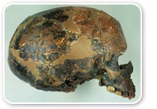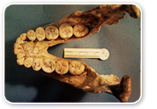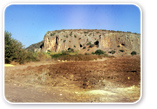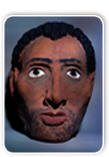| |
The documents distributed here have been provided as a
means to ensure timely dissemination of scholarly and
technical work on a noncommercial basis. Copyright and
all rights therein are maintained by the authors or by
other copyright holders, notwithstanding that they have
offered their works here electronically. It is
understood that all persons copying this information
will adhere to the terms and constraints invoked by each
author's copyright. These works may not be reposted
without the explicit permission of the copyright holder.
Papers with full text are
marked with a
[pdf] hypertext.
The linked documents can be viewed with Adobe
Acrobat Reader. If you are unable to open
the documents
click here to download the reader.
Fossil hominids
Faerman, M., Kharitonov, V., Batsevich, V., Zilberman,
U. and Smith, P. (1994) A Neandertal infant from the
Barakai Cave, Western Caucasus. J. Human Evolution,
27(5): 405-415.
[pdf]
Smith, P., Gomori, J.M., Spitz, S. and Becker, J. (1997)
Model for the examination of evolutionary trends in
tooth development. Am. J. Phys. Anthrop., 102: 283-294.[pdf]
Haydenblit, R. Podbilewicz, B. and Smith, P. (2000)
Evolution of human enamel growth analyzed by confocal
microscopy. In: Proceedings of the11th International
Symposium on Dental Morphology, eds. J. Mayhall and T.
Heikkinen, Finland, Oulu University Press, pp.228-235.
[pdf]
Smith, P., Gomori, J.M., Shaked, R., Haydenblit, R. and
Joskowicz, L. (2000) A computerized approach to
reconstruction of growth patterns in hominid molar
teeth. In: Proceedings of the 11th International
Symposium on Dental Morphology, eds. J. Mayhall and T.
Heikkinen, Finland, Oulu University Press, pp. 388-397.
[pdf]
Zilberman, U., Smith, P., Piperno, M. and Condemi, S.
(2004). Evidence of amelogenesis imperfecta in an Early
African Homo erectus. J Hum Evol. 46: 647-653
[pdf]

Skeletal Biology
Smith, P. (1995) People of the Holy Land from prehistory
to the recent past. In: The Archeology of Society in the
Holy Land, ed. T. Levy, Leicester University Press,
pp.58-74.
[pdf]
Smith, P. and Sabari, P. (1996) The human remains from
the Church. In: Yoqne'am I. Qedem Reports 3, eds. A.
Ben-Tor, M. Avissar and Y. Portugali, pp.242-245.
Smith, P. (1997) Skeletal analysis. In: The Oxford
Encyclopedia of Archaeology in the Near East
(Ed.-in-chief: E. Meyers), Oxford University Press vol.
4, pp. 51-56.
Smith, P., Horwitz, L.K. (1997) Human skeletal remains
from areas A and B at Yiftah'el. In: Yiftahe'l. Salvage
and Rescue Excavations at a Prehistoric Village in Lower
Galilee, Israel. Antiquities Monographs, ed. E. Braun,
Jerusalem, Israel Antiquities Authority, pp.172-180.
Levy, T.E., Alon, D., Smith, P., Yekutieli, Y., Rowan,
Y., Goldberg, P., Porat, N., van den Brink, E.C.M.,
Witten, A.J., Golden, J., Grigson, C., Kansa, E.,
Dawson, L., Holl, A., Moreno, J., Kersel, M. (1997)
Egyptian-Canaanite interaction at Nahal Tillah, Israel
(ca. 4500-3000 B.C.E.): An interim report on the
1994-1995 excavations. Bulletin of the American School
of Oriental Research, 307: 1-51.
Horwitz, L.K. and Smith, P. (1997) The taphonomy of
human bones from hyaena accumulations. In L.A. Hannus,
L. Rossum and R. P. Winham (eds.) Proceedings of the
1993 Bone Modification Conference, Hot Springs South
Dakota. Occasional Publication No. 1, Augustina College
Sioux Falls, pp.188-194.
Smith, P., Horwitz, L.K. (1998) Human and animal remains
from Sha'ar Ephraim. Tel Aviv, 25: 110-115.
Smith, P. (1998) A human skull from Tel Te'enim. Tel
Aviv, 25: 104.
Smith, P. and Siegal, S. (1998) The human remains. In:
Villages, Terraces and Stone Mounds. Excavations at
Manhat, Jerusalem 1987-1989, eds. G. Edelstein, I.
Milevski and S. Aurant, Jerusalem, Israel Antiquities
Authority Reports 3, Chapter 10: pp.102-103.
Oakberg, K., Levy, T. and Smith, P. (2000) A method for
skeletal arsenic analysis applied to the Chalcolithic
copper smelting site of Shiqmim, Israel. Journal of
Archeological Science, 27: 895-901.
[pdf]
Horwitz, L.K. and Smith, P. (2000) The contribution of
animal domestication to the spread of Zoonoses: A case
study from the southern Levant. IBEZ, J. Mt. ECOL., 5:
77-84 (Anthropozoologica, 31:77-84, 2000).
[pdf]
Smith, P. (2000) Human remains. In: Encyclopedia of the
Dead Sea Scrolls, vol 2, eds. L.H. Schiffman and J.C.
VaderKam, Oxford University Press, pp.880-882.
Kahila Bar-Gal, G., and Smith, P. (2001) The human
remains. In: Tel Te’o. A Neolithic, Chalcolithic and
Early Bronze Age Settlement in the Hula Valley, eds. E.
Eisenberg, A. Gopher, and R. Greenberg, Jerusalem:
Israel Antiquities Authority Reports, no. 13,
pp.163-169.
[pdf]
Zagerson T. and Smith P. (2002) The human remains. In:
The Chalcolithic Mortuary Site at Kissufim Road, Israel,
eds. Y. Goren and P. Fabian. Israel Antiquities
Authority Reports. no.16, chapter 10, pp. 57-65.
[pdf]
Smith P. (2002) The paleobiological evidence for
admixture between populations in the Southern Levant and
Egypt in the Fourth to third Millenia BCE. In: Egypt and
the Levant: New Approaches to Anthropological
Archaeology, eds. T.E. Levy and E.C.M. Van der Brink,
London, Leicester University Press, pp. 118-128.
[pdf]
Lev Tov N., Smith P. and Gopher A. (2003) Dental
Evidence for Dietary Practices in the Chalcolithic
period: The Findings from a Burial Cave in Peqi’in
(Northern Israel). Paleorient Vol. 29/1: 121-134.
[pdf]
Peretz, B. and Smith, P. (2004) Dental morphology and
pathology of Middle Bronze Age populations in Israel:
Sasa and Jebel Qa’aqir. Atiqot 46:45-49.
[pdf]
Smith, P. (2004). Middle Bronze Age II burials at Sasa,
Upper Galilee (Tomb 1 and Graves 37, 39). Atiqot
46:35-43.
[pdf]

Dental Anthropology
Smith, P., Peretz, B. and Forte-Koren R. (1995) The
ontogeny of cusp morphology: The evidence from tooth
germs. In: Proceedings of the 10th International
Symposium on Dental Morphology, Berlin, Sept. 6-10,
1995, eds. R.J. Radlanski and H. Renz, Berlin, "M"
Marketing Services, pp.49-53.
Peretz B., Shapira J., Farbstein, H., Arieli, E. and
Smith, P. (1996) Modification of tooth size and shape in
Down's syndrome. J. Anat., 188: 167-172.
Smith, P., Gomori, J.M., Spitz, S. and Becker, J. (1997)
Model for the examination of evolutionary trends in
tooth development. Am. J. Phys. Anthrop., 102: 283-294.[pdf]
Peretz, B., Nevis, N. and Smith, P. (1997) Morphometric
variables of developing primary maxillary first molar
crowns in humans. Arch Oral Biol., 42: 423-427.
[pdf]
Peretz, B., Nevis, N., Smith, P. (1998) Morphometric
analysis of developing crowns of maxillary primary
second molars and permanent first molars in humans.
Archives of Oral Biology, 43: 525-533.
[pdf]
Peretz B, Shapiro J and Smith P. (2000) Size and shape
modification of molars in children with Down syndrome.
In: Proceedings of the 11th International Symposium on
Dental Morphology, eds. J. Mayhall and T. Heikkinen,
Finland, Oulu University Press, pp.140-143.
[pdf]
Haydenblit, R. Podbilewicz, B. and Smith, P. (2000)
Evolution of human enamel growth analyzed by confocal
microscopy. In: Proceedings of the11th International
Symposium on Dental Morphology, eds. J. Mayhall and T.
Heikkinen, Finland, Oulu University Press, pp.228-235.
[pdf]
Smith, P., Gomori, J.M., Shaked, R., Haydenblit, R. and
Joskowicz, L. (2000) A computerized approach to
reconstruction of growth patterns in hominid molar
teeth. In: Proceedings of the 11th International
Symposium on Dental Morphology, eds. J. Mayhall and T.
Heikkinen, Finland, Oulu University Press, pp. 388-397.
[pdf]
Zilberman, U., Smith, P and Alvesalo, L. (2000) Crown
components of mandibular molar teeth in 45,x females
(Turner syndrome). Archives of Oral Biology, 45:
217-225.
[pdf]
Zeygerson T, Smith P., and Heydenblit R. (2000)
Intercusp differences in enamel prism patterns in early
and late stages of human tooth development. Arch Oral
Biol., 45: 1091-1099.[pdf]
Zilberman, U. and Smith, P. (2001) Sex and age related
differences in primary and secondary dentine formation.
Adv. Dent. Res., 15: 42-45.
[pdf]
Smith P., Avishai G., (2005) The Use of Dental Criteria
for Estimating Postnatal Survival in Skeletal Remains of
Infants, Journal of Archeological Sciences 32/1 pp.
83-89.
[pdf]
Faerman, M., Kharitonov, V., Batsevich, V., Zilberman,
U. and Smith, P. (1994) A Neandertal infant from the
Barakai Cave, Western Caucasus. J. Human Evolution,
27(5): 405-415.
[pdf]
Zilberman, U. and Smith, P. (2001) Sex and age related
differences in primary and secondary dentine formation.
Adv. Dent. Res., 15: 42-45.
[pdf]
Zilberman, U., Smith, P., Kupietzky, A., and Mass, E.
(2004) The effect of hereditary disorders on tooth
components: a radiographic morphometric study of two
syndromes. Arch Oral Biol, 49:621-929.
[pdf]
Peretz, B. and Smith, P. (2004) Dental morphology and
pathology of Middle Bronze Age populations in Israel:
Sasa and Jebel Qa’aqir. Atiqot 46:45-49.
[pdf]
Zilberman, U., Smith, P., Piperno, M. and Condemi, S.
(2004). Evidence of amelogenesis imperfecta in an Early
African Homo erectus. J Hum Evol. 46: 647-653
[pdf]
Lev Tov N., Smith P. and Gopher A. (2003) Dental
Evidence for Dietary Practices in the Chalcolithic
period: The Findings from a Burial Cave in Peqi’in
(Northern Israel). Paleorient Vol. 29/1: 121-134.
[pdf] Coming soon
Avishai G., Müller R., Gabet Y., Bab I., Zilberman U.,
Smith P. (2004) A New Approach to Quantifying
Developmental Variation in the Dentition Using Serial
Microtomographic Imaging, Microscopy Research and
Technique 65:263-269.
[pdf]

Palaeopathology
Smith, P. (1990). The trephined skull from the Early
Bronze Age period at Arad. The Israel Exploration
Society 21:89-93.[pdf]
Filon, D., Faerman, M., Smith, P. and Oppenheim, A.
(1995) Sequence analysis reveals a beta-thalassemia
mutation in the DNA of skeletal remains from the
archaeological site of Akhziv, Israel. Nature Genetic,
9: 365-368.[pdf]
Smith, P. and Horwitz, L.K. (1998) Culture, environment
and disease: Paleo-anthropological findings for the
Southern Levant. In: Archaeology of Emerging Diseases,
eds. C. Greenblatt and I. Cohen, Rehovot: Balaban
Publishers, pp.201-240.
[pdf]
Faerman, M., Jankauskas, R., Gorski, A., Bercovier, H. &
Greenblatt, C.L. (1997). Prevalence of human
tuberculosis in Medieval population of Lithuania based
on ancient DNA analysis. Ancient Biomolecules 1 :
205-214.
Faerman, M., Nebel, A., Filon, D., Thomas, M.G., Bradman,
N., Ragsdale B., Schultz, M., Oppenheim, A. (2000). From
a dry bone to a genetic portrait: A case study of sickle
cell anemia. American Journal of Physical Anthropology
111 (2): 153-163.
[pdf]
Faerman, M., Jankauskas, R. (2000). Palaeopathological
and molecular evidence of human bone tuberculosis in
Iron Age Lithuania. Anthropologischen Anzeiger 58 (3):
57-62.

DNA analysis
a) Ancient DNA
Filon, D., Faerman, M., Smith, P. and Oppenheim, A.
(1995) Sequence analysis reveals a beta-thalassemia
mutation in the DNA of skeletal remains from the
archaeological site of Akhziv, Israel. Nature Genetic,
9: 365-368.[pdf]
Faerman, M., Filon, D., Kahila, G., Greenblatt, C.L.,
Smith, P. and Oppenheim, A. (1995) Sex identification of
archaeological human remains based on amplification of
the X and Y amelogenin alleles. Gene, 167: 327-332.
[pdf]
Woodward, S.R., Kahila, G., Smith, P., Greenblatt, C.,
Zias, J. and Broshi, M. (1996) Analysis of parchment
fragments from the Judea Desert using DNA techniques.
In: Current Research and Technological Developments on
the Dead Sea Scrolls, eds. D.W. Parry and S.D. Ricks,
Leiden, E.J. Brill, pp.215-238.
Faerman, M., Kahila, G., Smith, P., Greenblatt, C.L.,
Stager, L., Filon, D., Oppenheim, A. (1997) DNA analysis
reveals the sex of infanticide victims. Nature, 385:
212-213.
[pdf]
Faerman, M., Kahila Bar-Gal, G., Filon, D., Greenblatt,
C.L., Stager, L., Oppenheim, A., Smith, P. (1998)
Determining the sex of infanticide victims from the Late
Roman era through ancient DNA analysis. Journal of
Archaeological Science, 25: 861-865.
[pdf]
Smith, P., Kahila, G., Filon, D., Oppenheim, A.,
Eisenburg E., Faerman, M. (1999) The applications of
ancient DNA analysis to archaeological problems. In: The
Practical Impact of Science on Near Eastern and Aegean
Archaeology, eds. S. Pike and S. Gitin, Wiener
Laboratory Publication No. 3, London: Archetype Press,
pp.71-74.
Faerman, M., Jankauskas, R., Gorski, A., Bercovier, H. &
Greenblatt, C.L. (1997). Prevalence of human
tuberculosis in Medieval population of Lithuania based
on ancient DNA analysis. Ancient Biomolecules 1 :
205-214.
Faerman, M., Nebel, A., Filon, D., Thomas, M.G., Bradman,
N., Ragsdale B., Schultz, M., Oppenheim, A. (2000). From
a dry bone to a genetic portrait: A case study of sickle
cell anemia. American Journal of Physical Anthropology
111 (2): 153-163.
[pdf]
Faerman, M., Jankauskas, R. (2000). Palaeopathological
and molecular evidence of human bone tuberculosis in
Iron Age Lithuania. Anthropologischen Anzeiger 58 (3):
57-62.
Mays, S. & Faerman, M. (2001). Sex identification in
some putative infanticide victims from Roman Britain
using ancient DNA. Journal of Archaeological Science.
28: 555-559.
[pdf]

b) Modern DNA
Nebel, A., Filon, D., Weiss, D., Weale, M., Faerman, M.,
Oppenheim, A., Thomas, MG. (2000). High-resolution Y
chromosome haplotypes of Israeli and Palestinian Arabs
reveal geographic substructure and substantial overlap
with haplotypes of Jews. Human Genetics 107: 630-641.
[pdf]
Nebel, A., Filon, D., Hohoff, C., Faerman, M., Brinkmann,
B., Oppenheim, A. (2001). Haplogroup-specific deviation
from the stepwise mutation model at the microsatellite
loci DYS388 and DYS392. European Journal of Human
Genetics 9:22-26.
[pdf]
Nebel, A., Filon, D., Brinkman, B., Majumder, P.,
Faerman, M., Oppenheim, A. (2001). The Y chromosome pool
of Jews as part of the genetic landscape of the Middle
East. American Journal of Human Genetics 69(5):1095-112.[pdf]
Nebel A, Landau-Tasseron E, Filon D, Oppenheim A,
Faerman M. (2002). Genetic evidence for the expansion of
Arabian tribes into the Southern Levant and North
Africa. American Journal of Human Genetics 70(6):1594-6.
[pdf]
Nebel, A, Filon, D, Faerman, M, Soodyall, H, Oppenheim,
A. (2005). Y chromosome evidence for a founder effect in
Ashkenazi Jews. European Journal of Human Genetics
13(3):388-391.
[pdf]

|
|










